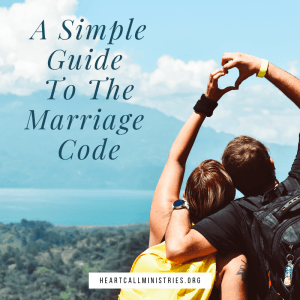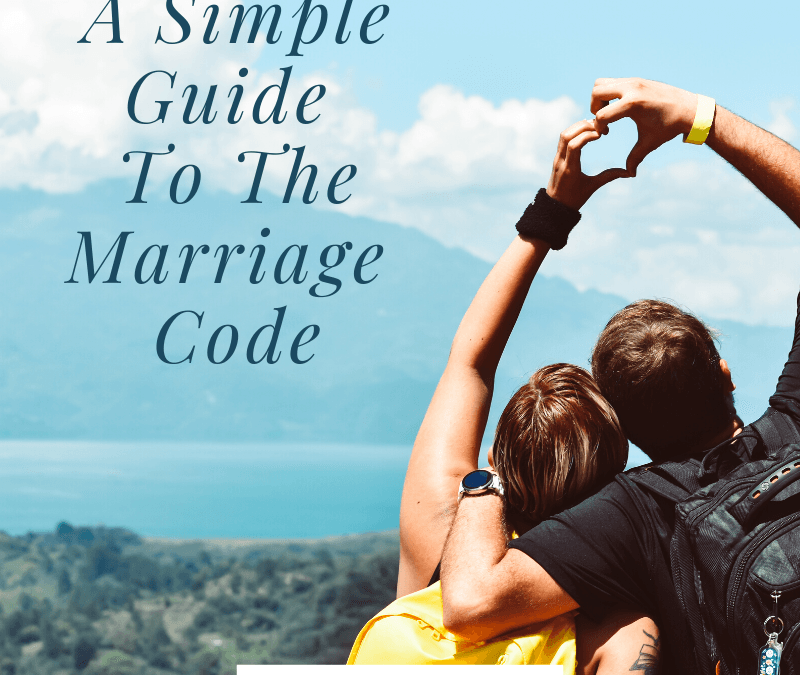
A Simple Guide to the Marriage Code: Love and Respect
After the Wedding
After the engagement, the Pinterest-y bridal showers, and the honeymoon, comes…
The Marriage!
The bride and groom start out with the highest hopes and the best intentions:
- Our marriage will be amazing.
- We will hardly ever fight.
- Good communication will prevail.
- Our goals are unified.
- We will do marriage better than our parents.
Communication Problems?
Even if we married our soulmate, had the best premarital counseling and read all the right books, daily life takes over after the wedding, with all of its busyness and demands.
Then years go by, habits are formed, and negative patterns take hold. Even stable marriages struggle to connect at times. Poor communication can lead to disappointment, wounds, and bitterness.
We could function and thrive if we could just survive communicating. But so often, the unintentional things we do seem to provoke our spouse, and negative conversations often lead to a fight or unproductive silence.
How can we avoid trouble and learn to communicate effectively? How do we crack the code?
The Code: Love and Respect
So, what’s the marriage code? It’s given freely in Ephesians 5:33:
“To sum up, each one of you is to love his wife as himself, and the wife is to respect her husband.”
This passage gives a command that addresses the two basic longings of women and men:
- Women crave Love.
- Men crave Respect.
Once we discover the code (the core desire of our spouse), things start to make sense. It becomes easy to see why conversations break down and fights happen, because:
- Actions that seem normal to you may appear unloving to your wife.
- Words and tone that seem innocent to you may seem disrespectful to your husband.
Survey Says
Dr. Emerson Eggerichs, author of Love and Respect, conducted a survey, where he posed a question to a large number of men and women:
If you were forced to choose one of the following, which would you prefer to endure… to be left alone and unloved in the world, or to feel inadequate and disrespected by everyone?
- The majority of men said they would prefer feeling alone and unloved rather than disrespected.
- The majority of women said they would rather feel disrespected than alone and unloved.
Eggerichs suggests that a key to a better marriage is to realize the core need of your spouse and act on it.
Different Needs
It’s natural to look at our spouse through the lens of our own needs, instead of looking at things from our spouse’s perspective:
- That wouldn’t offend me…why is she so upset?
- I just shared my opinion; doesn’t he care what I think?
Knowing the code of love and respect, you can look at the situation through their perspective and you may see why your actions or words triggered a reaction.
It’s natural to assume that the unfamiliar, clashing needs of others are selfish because those needs are not our needs. Ask yourself:
- Is it okay for your husband to have a need that you don’t have?
- Is it okay for your wife to have a need that you don’t have?
The Bottom Line
Knowing the code of Love and Respect can help us understand each other, a process that takes patience and perseverance.
Ephesians 4:2-3 says: “Be completely humble and gentle; be patient, bearing with one another in love. Make every effort to keep the unity of the Spirit through the bond of peace.”
Get the Couple’s Guide to enacting the code for a loving marriage. This guide includes an individual assessment for the wife and for the husband to determine if there is a possible negative cycle present, a Goal setting sheet to help set goals for stopping the negative cycle, and questionnaire to determine the next steps you should take if there is a negative cycle present.

